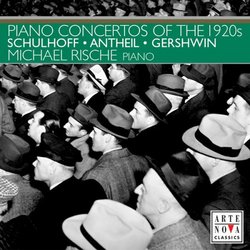More Jazzy Classics from the 20s
M. C. Passarella | Lawrenceville, GA | 03/03/2006
(5 out of 5 stars)
"This is every bit as distinguished an effort as Michael Rische's Piano Concertos of the 1920s, Volume 1. If anything, it is even more of a revelation because of the inclusion of Erwin Schulhoff's Concerto. This is clearly an important work. It starts off with a mysterious, quasi-improvisatory movement that sounds like the world's most high-class movie music, but that's only because in the 1930s and 40s movie music composers would finally catch up with Schulhoff. By the end of the movement we are in a tortured musical dream world, haunted by cascading harps and slashing percussion. The next movement is quieter but equally mysterious, with a long, ruminative cadenza for the pianist. It's only in the last movement that Schulhoff unleashes his version of jazz, and it's a corker, mixing as it does jazz and Gypsy(!) music.
George Antheil's Jazz Symphony isn't in quite the same class, but it's all over in a compact 13 minutes and is predictably wild, beginning with a tango-influenced section that quickly devolves into a crazy jazz episode with wailing brass and xylophone scales. The piano enters with some Petruschka-like utterances before the tuba and banjo take us briefly back to New Orleans. Toward the end, there are the usual obeisances to (or outright plagiarisms from) Stravinsky--Petruschka, Ragtime--before we end with Busby Berkley. This Antheil's a wild and crazy guy, but I like him!
With the Gershwin Concerto, we're in familiar territory, and Rische and Marshall don't really add anything to our understanding or enjoyment of this popular work. On the other hand, if their performance doesn't rival classics such as Wild/Fiedler, they give us a thoroughly attractive reading that catches all the verve and moxie of Gershwin's best orchestral work.
This disc is a great deal of fun with (thanks to Schulhoff) a serious side as well, and I highly recommend it.
"


 Track Listings (7) - Disc #1
Track Listings (7) - Disc #1